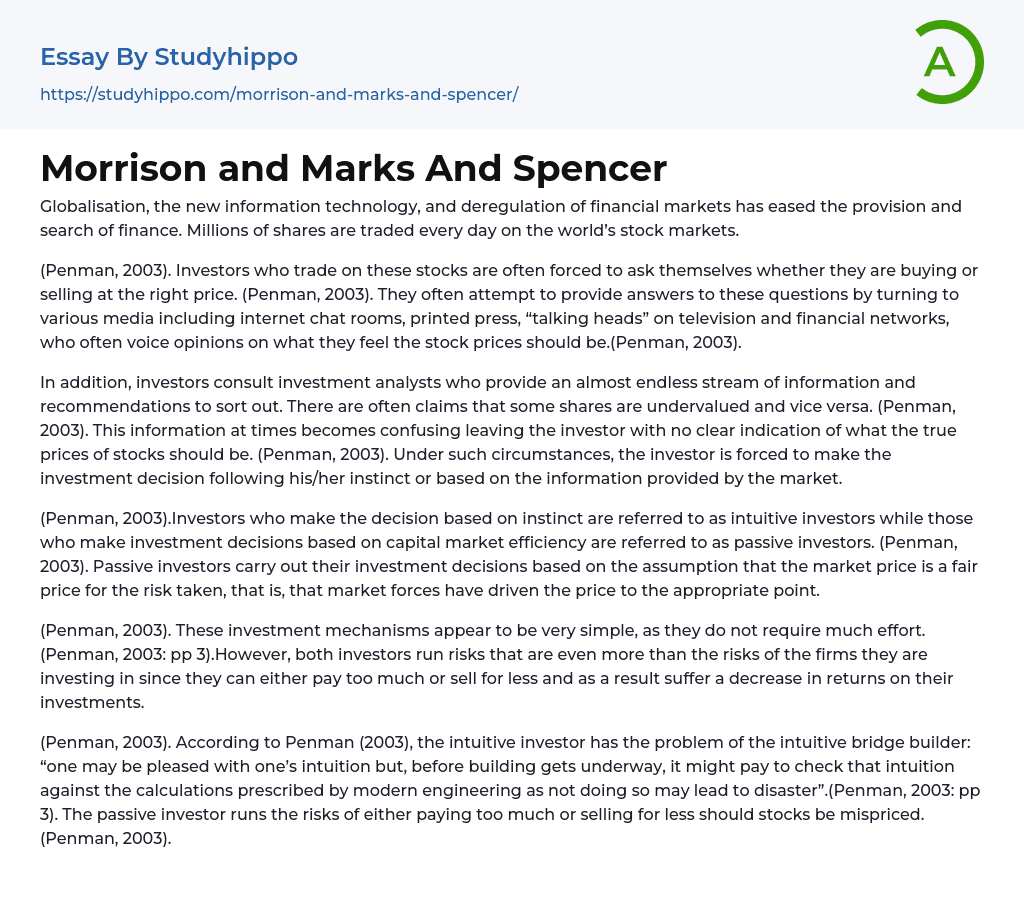Finance has become more accessible due to globalisation, advancements in information technology, and the deregulation of financial markets. The world’s stock markets see millions of shares traded daily.
According to Penman (2003), individuals who invest in stocks frequently contemplate if they are purchasing or selling at an appropriate value. To obtain insights, they seek information from multiple sources such as online discussion forums, printed media, and financial experts on television and networks. These experts often express their opinions regarding the desirable stock prices.
Investors rely on investment analysts for extensive information and recommendations on stocks. There are frequent assertions of undervalued and overvalued shares, leaving investors confused about the true prices. As a result, they may rely on their instincts or market-provided information to make investment decisions. (Penman, 2003)
(Penman, 2003)
...The two types of investors are intuitive investors who rely on instinct and passive investors who base their investment decisions on capital market efficiency. Passive investors operate under the belief that the price of a market is reflective of the risk taken, as market forces determine the price to be at an appropriate level.
According to Penman (2003), investing through these mechanisms is straightforward and effortless, but it carries significant risks. Both investors face higher risks than the companies they invest in, because they can either overpay or sell for less, which can lead to reduced returns on their investments (Penman, 2003: pp 3).
Penman (2003) highlights the issue of intuition in investing. He compares it to the problem faced by bridge builders who may be confident in their intuition but need to ensure that their calculations match modern engineering standards to prevent disasters. Similarly, the intuitive investor
should check their intuition against modern financial analysis to avoid potential losses. Penman (2003: pp 3) warns that passive investors also face risks, such as overpaying or selling for less due to mispriced stocks.
Although economic and contemporary finance theory such as Bodie et al (2002) and Penman (2003) forecast that capital markets are flawless, it is still wise to conduct thorough research before taking any action - as cautioned by Penman (2003). As a result, both a passive and intuitive investor can be exposed to the risk of trading with a well-informed individual who has analysed every detail, highlighting the importance of in-depth research. This study aims to perform a comparative analysis of four retail companies based in the UK, and will place emphasis on aspects such as the macroeconomic environment, industry analysis, products, customers, strategy, finance and value. The ultimate goal is to provide investors with reasonable recommendations on which company's stock to buy, sell or hold. The following sections will be discussed in this paper: Section 2 analyses the macroeconomic environment supporting these companies. Section 3 scrutinizes the retail industry - the industry in which the four companies operate. Lastly, Section 4 studies each company through product analysis, customer review, employee management appraisal, corporate governance and an evaluation of their stock value.
Section 5 concludes by recommending to investors which company they should hold, buy, or sell, and also provides a methodology for valuing and appraising that method in comparison to other methods.
- Chief Executive Officer essays
- Convenience Store essays
- Firm essays
- Training And Development essays
- Unilever essays
- Variable Cost essays
- Virgin Group essays
- Bargaining essays
- Entity essays
- Pest analysis essays
- Bankruptcy essays
- Earnings essays
- Tata Group essays
- S corporation essays
- Secretary essays
- Premise essays
- Asset essays
- Depreciation essays
- Discounted Cash Flow essays
- Foreign Direct Investment essays
- Funds essays
- Internal Rate Of Return essays
- Revenue essays
- Day Trading essays
- Futures Trading essays
- Capital market essays
- Million essays
- Payment essays
- Rate Of Return essays
- Funding essays
- Hedge Fund essays
- Leadership and Management essays
- Change Management essays
- Project Management essays
- Knowledge Management essays
- Operations Management essays
- Quality Management essays
- Risk Management essays
- Scientific Management essays
- supply chain management essays
- Performance Management essays
- Time Management essays
- Brand Management essays
- Total Quality Management essays
- Risk essays
- Manager essays
- Leadership essays
- Business Ethics essays
- Board Of Directors essays
- Product Management essays




